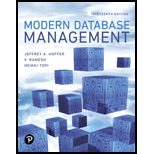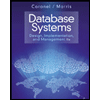
Modern Database Management
13th Edition
ISBN: 9780134773650
Author: Hoffer
Publisher: PEARSON
expand_more
expand_more
format_list_bulleted
Concept explainers
Textbook Question
Chapter 4, Problem 4.40PAE
Transform Figure 2-15a, attribute version, to 3NF relations. Transform Figure 2-15b, relationship version, to 3NF relations. Compare these two sets of 3NF relations with those in Figure 4-10 What Observations and conclusions do you reach by comparing these different sets of 3NF relations?
Expert Solution & Answer
Want to see the full answer?
Check out a sample textbook solution
Students have asked these similar questions
I need to define and discuss the uses of one monitoring or troubleshooting tool in Windows Server 2019. thank you
I would likr toget help with the following concepts:
- Windows Server features
- Windows Server versus Windows 10 used as a client-server network
I need to define and discuss the uses of one monitoring or troubleshooting tool in Windows Server 2019. thank you
Chapter 4 Solutions
Modern Database Management
Ch. 4 - Define each of the following terms: determinant...Ch. 4 - Prob. 4.2RQCh. 4 - Prob. 4.3RQCh. 4 - Describe the primary differences between the...Ch. 4 - Summarize six important properties of relations.Ch. 4 - Describe two properties that each candidate key...Ch. 4 - Describe the three types of anomalies that can...Ch. 4 - Demonstrate each of the anomaly types with an...Ch. 4 - Fill in the blanks in each of the following...Ch. 4 - What is a well-structured relation? Why are...
Ch. 4 - Prob. 4.11RQCh. 4 - Describe how the following components of an E-R...Ch. 4 - Prob. 4.13RQCh. 4 - Prob. 4.14RQCh. 4 - Briefly describe four typical problems that often...Ch. 4 - Prob. 4.16RQCh. 4 - Explain how each of the following types of...Ch. 4 - Prob. 4.18RQCh. 4 - Prob. 4.19RQCh. 4 - Prob. 4.20RQCh. 4 - Prob. 4.21RQCh. 4 - What is the relationship between the primary key...Ch. 4 - Prob. 4.23RQCh. 4 - Explain what can be done with primary keys to...Ch. 4 - Prob. 4.25RQCh. 4 - Explain three conditions that suggest a surrogate...Ch. 4 - Prob. 4.27RQCh. 4 - For each of the following E-R diagrams from...Ch. 4 - Prob. 4.29PAECh. 4 - Prob. 4.30PAECh. 4 - For your answers to the following Problems and...Ch. 4 - Figure 4-3212 shows a class list for Millennium...Ch. 4 - Prob. 4.33PAECh. 4 - Prob. 4.34PAECh. 4 - Prob. 4.35PAECh. 4 - Prob. 4.36PAECh. 4 - Prob. 4.37PAECh. 4 - Prob. 4.38PAECh. 4 - Prob. 4.39PAECh. 4 - Transform Figure 2-15a, attribute version, to 3NF...Ch. 4 - The Public Safety office at Millennium College...Ch. 4 - Prob. 4.42PAECh. 4 - Prob. 4.43PAECh. 4 - Prob. 4.44PAECh. 4 - For your answers to Problem and Exercise 3-33 from...Ch. 4 - Prob. 4.46PAECh. 4 - Prob. 4.47PAECh. 4 - Figure 4-38 includes an EER diagram for a...Ch. 4 - Prob. 4.49PAECh. 4 - Prob. 4.50PAECh. 4 - Prob. 4.51PAECh. 4 - Prob. 4.52PAECh. 4 - Figure 4-40 shows an EER diagram for a university...Ch. 4 - Explore the data included in Table 4-9. Assume...Ch. 4 - Prob. 4.55PAECh. 4 - Prob. 4.56PAECh. 4 - Prob. 4.57PAECh. 4 - Prob. 4.58PAE
Knowledge Booster
Learn more about
Need a deep-dive on the concept behind this application? Look no further. Learn more about this topic, computer-science and related others by exploring similar questions and additional content below.Similar questions
- Please solve and answer the questions correctly please. Thank you!!arrow_forwardConsidering the TM example of binary sum ( see attached)do the step-by-step of execution for the binary numbers 1101 and 11. Feel free to use the Formal Language Editor Tool to execute it; Write it down the current state of the tape (including the head position) and indicate the current state of the TM at each step.arrow_forwardI need help on inculding additonal code where I can can do the opposite code of MatLab, where the function of t that I enter becomes the result of F(t), in other words, turning the time-domain f(t) into the frequency-domain function F(s):arrow_forward
arrow_back_ios
SEE MORE QUESTIONS
arrow_forward_ios
Recommended textbooks for you
 Principles of Information Systems (MindTap Course...Computer ScienceISBN:9781305971776Author:Ralph Stair, George ReynoldsPublisher:Cengage Learning
Principles of Information Systems (MindTap Course...Computer ScienceISBN:9781305971776Author:Ralph Stair, George ReynoldsPublisher:Cengage Learning Database Systems: Design, Implementation, & Manag...Computer ScienceISBN:9781305627482Author:Carlos Coronel, Steven MorrisPublisher:Cengage Learning
Database Systems: Design, Implementation, & Manag...Computer ScienceISBN:9781305627482Author:Carlos Coronel, Steven MorrisPublisher:Cengage Learning Database Systems: Design, Implementation, & Manag...Computer ScienceISBN:9781285196145Author:Steven, Steven Morris, Carlos Coronel, Carlos, Coronel, Carlos; Morris, Carlos Coronel and Steven Morris, Carlos Coronel; Steven Morris, Steven Morris; Carlos CoronelPublisher:Cengage Learning
Database Systems: Design, Implementation, & Manag...Computer ScienceISBN:9781285196145Author:Steven, Steven Morris, Carlos Coronel, Carlos, Coronel, Carlos; Morris, Carlos Coronel and Steven Morris, Carlos Coronel; Steven Morris, Steven Morris; Carlos CoronelPublisher:Cengage Learning
 Fundamentals of Information SystemsComputer ScienceISBN:9781337097536Author:Ralph Stair, George ReynoldsPublisher:Cengage Learning
Fundamentals of Information SystemsComputer ScienceISBN:9781337097536Author:Ralph Stair, George ReynoldsPublisher:Cengage Learning Principles of Information Systems (MindTap Course...Computer ScienceISBN:9781285867168Author:Ralph Stair, George ReynoldsPublisher:Cengage Learning
Principles of Information Systems (MindTap Course...Computer ScienceISBN:9781285867168Author:Ralph Stair, George ReynoldsPublisher:Cengage Learning

Principles of Information Systems (MindTap Course...
Computer Science
ISBN:9781305971776
Author:Ralph Stair, George Reynolds
Publisher:Cengage Learning

Database Systems: Design, Implementation, & Manag...
Computer Science
ISBN:9781305627482
Author:Carlos Coronel, Steven Morris
Publisher:Cengage Learning

Database Systems: Design, Implementation, & Manag...
Computer Science
ISBN:9781285196145
Author:Steven, Steven Morris, Carlos Coronel, Carlos, Coronel, Carlos; Morris, Carlos Coronel and Steven Morris, Carlos Coronel; Steven Morris, Steven Morris; Carlos Coronel
Publisher:Cengage Learning


Fundamentals of Information Systems
Computer Science
ISBN:9781337097536
Author:Ralph Stair, George Reynolds
Publisher:Cengage Learning

Principles of Information Systems (MindTap Course...
Computer Science
ISBN:9781285867168
Author:Ralph Stair, George Reynolds
Publisher:Cengage Learning
Enhanced Entity Relationship Model; Author: Data Science Center;https://www.youtube.com/watch?v=ocQUtXPumdQ;License: Standard YouTube License, CC-BY